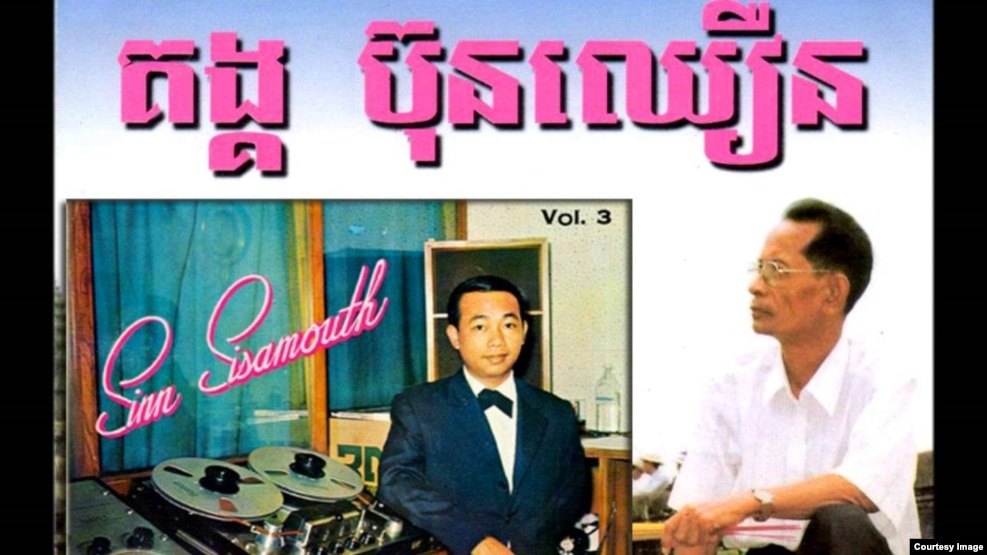24 June 2016
Hul Reaksmey
VOA Khmer

Bun Chhoeun composed more than 200 songs during Cambodia’s cultural “Golden Age” in the 1960s and 1970s, including writing a number of hit songs for the country’s top singers of the time, such as Sinn Sisamouth and Ros Serey Sothea.
Bun Chhoeun composed more than 200 songs during Cambodia’s cultural “Golden Age” in the 1960s and 1970s.
PHNOM PENH —
Residents of Battambang province are petitioning the government to memorialize and protect the legacy of the late author and singer-songwriter Kong Bun Chhoeun, who died on April 17.
Bun Chhoeun composed more than 200 songs during Cambodia’s cultural “Golden Age” in the 1960s and 1970s, including writing a number of hit songs for the country’s top singers of the time, such as Sinn Sisamouth and Ros Serey Sothea.
Through his prolific work he became known as the Master Poet of the Sangke River, one of the main waterways in his home province.
Uk Sarith, a local teacher who is campaigning on the issue, said modern writers and singers should continue to draw inspiration from his work, but cautioned against expropriating his work.
“If the songs are the songs he wrote, they should be sung to remember him. On the other hand, if they sing his songs, please don’t invent by mixing [them with other sounds]. Some sing his songs, but they mix them with other things. This is likely for youths,” he said.
He added that his works should be legally protected to avoid intellectual property theft.
Bun Chhoeun Sorida, the daughter of the famous artist, said the family was considering ways to protect his achievements from exploitation.
“We should not allow anyone to take our products to be copied arbitrarily, changing the original scripts,” she said.
Moth Thary, Sorida’s husband, agreed.
“This is his property left to us because he didn’t have anything like money left to his children, meaning he had only these things left. So we must protect them for him. This is our big goal,” he said.
As well as hiring a lawyer to seek to legally protect his works, the family is set to campaign for the construction of a statue in his honor.
Thary said they might not be able to rely on the provincial authorities to allow the construction of a statue of remembrance, however.
“We can’t disturb the local authorities to request the building of his statue, unless the local authorities think that is what should they do. This is the business of the local authorities. It would not be good for us if we went to ask to build [the statue],” he said.
Battambang Provincial Governor Chan Sophal, could not be reached for comment.
Suong Sophal, 37, a resident of Battambang’s Ek Phnom district, said locals would support the construction of a statue of Bun Chhoeun, who she said wrote beautiful music and poetry that current artists could not compete with.
“We support the idea because the old writers are pretty good,” she said, adding that there was a lack of creativity in modern music.
Born in October 1930 in Thma Kuol district, Bun Chhoeun was forcibly moved to Kampong Thom province with his wife and five children after the Khmer Rouge took power in May 1979. He was set to be executed with his wife after cadres discovered some of his films, which he had saved when he left Battambang. He was accused of being an agent for the Central Intelligence Agency, but was saved from death by a senior regime official who had read his novels and testified to their accurate depiction of class struggle.
He was later imprisoned at a security camp, but survived by selling paintings to Khmer Rouge cadres. He later left the country and spent his later years in Norway, where he died of cancer on April 17.
Thai Norak Satya, a spokesman for the Ministry of Culture and Fine Arts, said he welcomed the move to protect Bun Chhoeun’s legacy.
“The ministry welcomes not only Kong Bun Chhoeun but also for other [artists]. This welcome means the formation of the law is to welcome for all skillful people or the people who produced the outputs [art] to come and apply for intellectual property rights protection,” he said.
Bun Chhoeun was known to shun the limelight fame brought him, preferring to spend his time writing poems and songs while sitting by the river.
In his poem Thought for Life, he commented on the modern development of Cambodia.
“This development puts heavy pressure on the people; because development is not just material; the mind of the people also develops,” he wrote.
Bun Chhoeun is survived by his wife, Uch Kolab, and seven children.

No comments:
Post a Comment